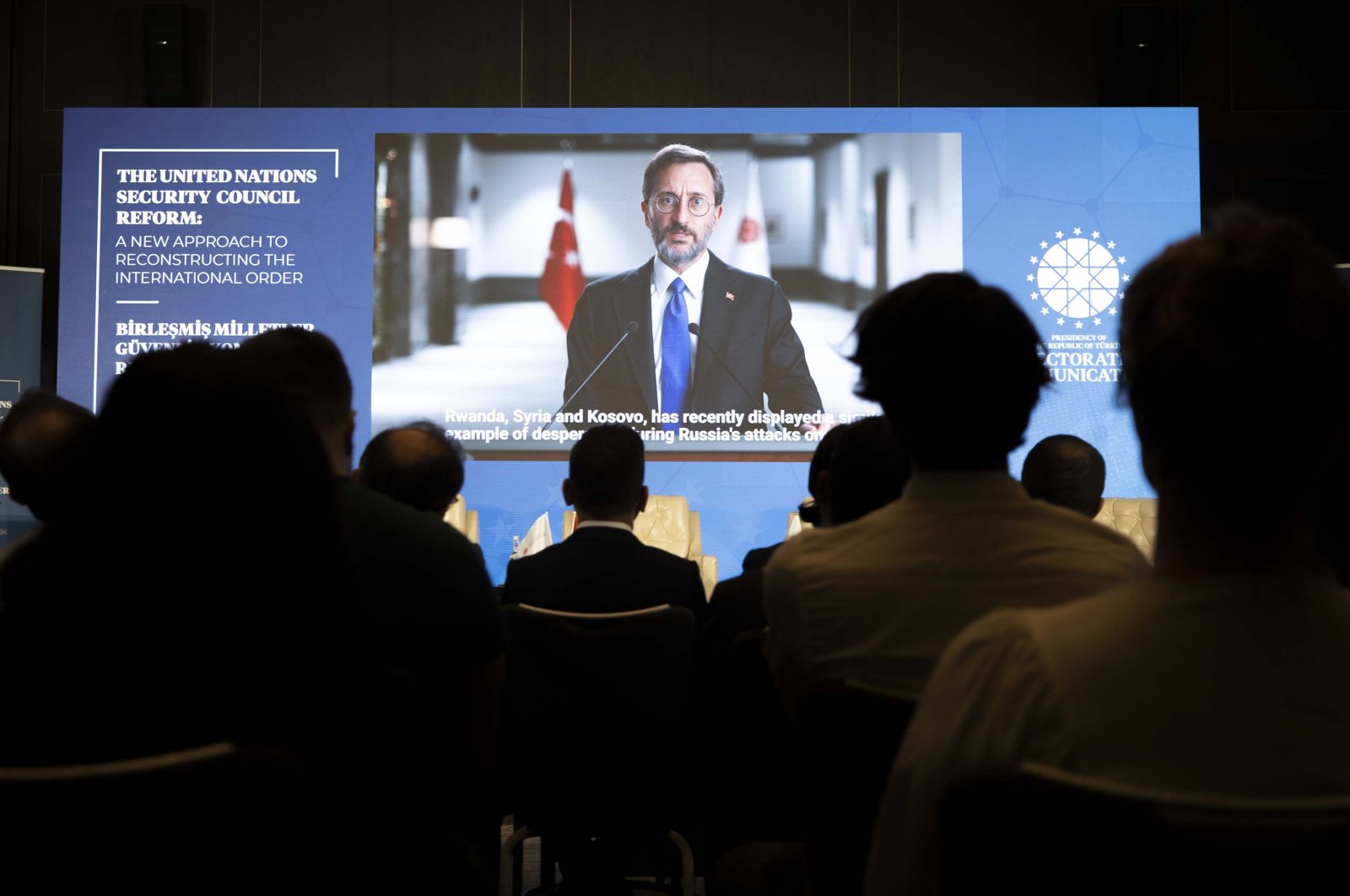
Türkiye's Directorate of Communications held a panel in London on Thursday to emphasize the critical need for a United Nations Security Council reform.
The United Nations Security Council is in urgent need of reform to safeguard international security and peace, provide solutions to global conflicts and save lives, a panel of academics and scholars said in discussions. Organized by Türkiye's Directorate of Communications and titled "United Nations Security Council Reform: A New Approach to Reconstructing the International Order," the conference heard speeches from a variety of senior scholars and academics well-versed in international relations who all see the need for the reform of global governance.
"We have seen time and again that the United Nations, in its current form, adds deadlock to global issues rather than solutions. We have seen how the processes can be blocked when one of the warring parties to the crisis is a permanent member of the U.N. The U.N., with this structure, is not on the side of the weak, the victim or the righteous but rather on the side of its five powerful permanent members. With its current structure, the U.N. is unable to speak out against the oppressor. The main reason for this is the problems in the institutional structure of the organization. It is a fact that Asian, Latin American and African countries are flagrantly excluded from representation in the U.N. Security Council," said Communications Director Fahrettin Altun.
"Our proposal for a solution, on the other hand, is to adopt the perspective expressed in the phrase 'The world is bigger than five,' which focuses on restructuring the U.N. Security Council. Peace and stability require a fairer, more resilient global U.N. system that reflects justice, multiculturalism and mutual respect," he added.
The contributors to the event included professor Çağrı Erhan, the rector of Altinbas University, professor Nurşin Ateşoğlu Güney, a faculty member of Istanbul Nisantasi University, Oliver McTernan of the think tank Forward Thinking, and Paul E. M. Reynolds, an author, analyst and former lecturer. Erhan and Güney are both members of Türkiye's Presidential Security and Foreign Policy Council.
‘The world is bigger than five'
The initiative to reform the Security Council, as well as the wider U.N. organization, began 10 years ago when the Turkish government expressed concerns over the lack of fairness and equality in the Security Council and especially surrounding the special status of its five permanent members (P5) – the United States, the U.K., Russia, China and France – who have the power of veto when it comes to votes in the council and the discussions to be held in the General Assembly.
Although other nations within the U.N. can be nominated as non-permanent members of the Security Council, as Türkiye was four times between 1951 and 2010, they have limited power and influence in affecting real change, as all outcomes are decided by the P5, and as such, an atmosphere of deadlock has existed within the council that has largely prevented the resolution of global conflicts and crises since its founding in 1945.
The panelists oftentimes quoted a famous saying on the issue by President Recep Tayyip Erdoğan, who said, "The world is bigger than five" – a reference to the five permanent members of the Security Council. As such, they called for a major rethink of how to conduct global governance through the U.N. and an alternative approach that would safeguard the interests of the international community, not individual states.
"Any institution is as good or as bad, effective or ineffective as the people who serve it. But I think it's equally true to say that the structures and rules of an institution can become self-defeating in achieving its goals and aims. And this I certainly believe to be true with regard to the United Nations," McTernan said.
"When the U.N. was founded, it was based on a wonderful aspirational idea and vision that grew out of the awareness of the horrors and the depravity that humanity was capable of inflicting on one another. Now the question we face today is has the U.N. succeeded in realizing this vision? The answer depends very much on what part of the world you have seen this vision delivered. If you live in Europe, then yes. But that certainly isn't true in many other parts of the world," he added.
Practical steps to reform U.N.
In light of these perceived inequalities and deadlock, it has been argued that the council exists to safeguard not the interests of the international community and global security but the interests of powerful individual states who maintain sway and influence due to their highly advanced economies and their possession of nuclear arsenals.
The hypocrisy and double standards of the U.N. have been repeatedly pointed out, with many comparing the hyped-up international reaction to Russia's attack on Ukraine to the silence over and neglect of other non-European conflicts and atrocities such as the indiscriminate attacks by Israeli forces on the occupied Gaza Strip. The panelists blamed this on the imbalance of power in the Security Council.
Türkiye has been at the forefront in calling for such changes. These include introducing term limits to the membership of the P5 in the council, as experienced by non-permanent members, and removing the power of the veto, which has prevented the U.N. from carrying out much-needed assistance throughout the world.
The initiative will be broadcast to audiences across the world with similar events being held in France, the United States, Japan and South Korea. Its aim is to raise awareness and foster an atmosphere of critical thinking and solution-driven ideas that would help reform the U.N. in a realistic and practical way.
